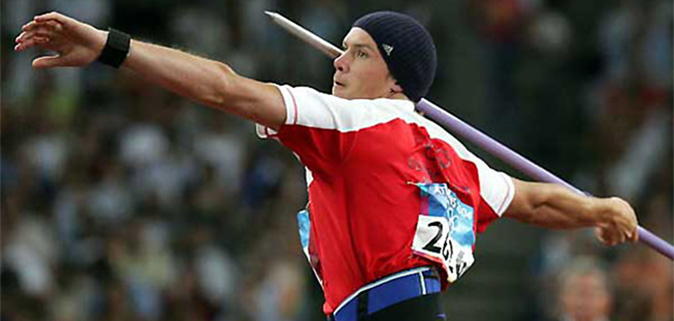Pauli Nevala, Finland

Pauli Lauri Nevala (born 30 November 1940 in Pohja) is a former track and field athlete from Finland who mainly competed in the men's javelin throw.
His first major international meet was the 1962 European Athletics Championships in Belgrade, where he went out in the qualification round. The next year saw him step up to the very upper echelon of javelin throwers with his new personal best (and national record) of 86.33 meters, thrown in Helsinki on July 16, 1963. This was very close to the world record at the time (86.74).
In the Olympic year 1964 however, Nevala had major problems even breaking 80 meters and didn't enter the Tokyo Olympics as one of the favorites. Nevala cleared the Olympic qualification quite easily while the leading favorite and new world record holder, Terje Pedersen of Norway, was shockingly knocked out – the first man not to qualify. In the final Nevala threw confidently from the start, and took the lead with his fourth throw of 82.66, his best that year. This was eventually enough for a surprising victory, narrowly ahead of Gergely Kulcsár.
As it turned out this didn't nudge Nevala's career back to an upwardly path, and his results stagnated. He still took a very respectable fourth place in the 1966 European Athletics Championships at Budapest. Nevala's attempt to defend his Olympic title at the 1968 Summer Olympics was cut short in the qualification as his longest throw was controversially declared flat and he failed to advance to the final.
In 1969 Nevala's career had a major resurgence, as he finally broke his six-year-old personal best multiple times, culminating in a 91.40 thrown in his home town of Teuva. At the 1969 European Championships Nevala took the silver medal behind Jānis Lūsis of the Soviet Union. Nevala has later openly attributed this resurgence to anabolic steroids, which were not yet forbidden at the time. The next year Nevala came very close to the world record (then 92.70 by fellow Finn Jorma Kinnunen) when he threw 92.64 in Helsinki on September 6, 1970. His career was suddenly ended in April 1971 when, in his very first competition of the year at Abidjan, Côte d'Ivoire, he injured his shoulder so badly he could never throw seriously again.
source: Wikipedia







